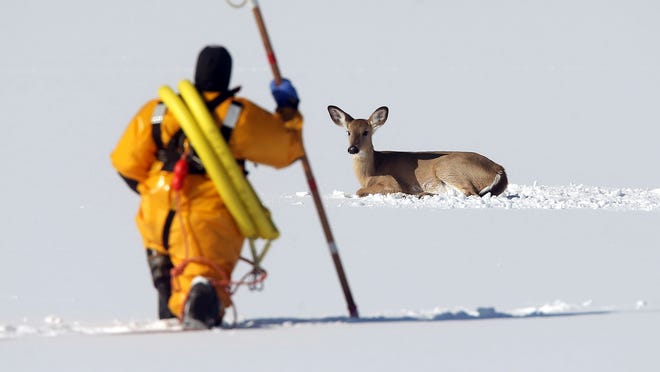A new variant of the coronavirus was found in a population of white-tailed deer in Ontario, Canada, and later a similar strand was found in a human who had contact with the deer, according to a new study.
For the study, researchers collected 300 samples in November and December 2021 from white-tailed deer in Canada and discovered that 17 of the deer in southwestern Ontario tested positive for SARS-CoV-2, according to the study. The Canada study was posted to the database bioRxiv and has not been published in a peer-reviewed journal.
Upon further research, they found a person who was infected with a genetically similar strain of SARS-CoV-2. The person lived in the same area and had close contact with the deer population before testing positive, according to the study. Researchers theorized it was at least possible the deer transmitted the virus to the human.
Could they spread it to humans?:A type of coronavirus is spreading significantly in deer in the US.
What is EHD? Is it contagious?:A disease is killing deer in some states.
However, scientists warned the study only states it’s possible and doesn’t confirm the deer infected the human.
“We don’t have enough information yet to confirm that transmission back to humans,” said Roderick Gagne, a wildlife disease ecologist at the University of Pennsylvania School of Veterinary Medicine told The New York Times.
When the researchers sequenced the genomes from five of the virus samples, they identified “a new and highly divergent lineage of SARS-CoV-2,” according to the study. The Centers for Disease Control and Prevention defines a lineage as a cluster of closely related viruses with a common ancestor and adds that SARS-CoV-2 has many lineages.
The study also found the lineage has a close genetic link to a strain that came from samples taken from humans and mink in Michigan two years ago, tweeted Finlay Maguire, an assistant professor at Dalhousie University in Halifax, Nova Scotia, and one of the paper’s authors.
This lineage had 76 mutations compared with the original version of the virus identified in Wuhan, China, and data suggests that the lineage may have been evolving in animals since late 2020, according to the study.
“There’s certainly no need to panic,” said Arinjay Banerjee, a virologist at the University of Saskatchewan who was not involved in either study, told The Times. “The more hosts you have, the more opportunities the virus has to evolve.”
After reviewing the study, Canada’s public health agency told The Guardian there was no evidence it had spread to humans and was likely an “isolated case”.
“Until we know more, people who hunt, trap or work closely with or handle wildlife should take precautions to prevent the potential spread of the virus,” the agency said on its website.
Follow Gabriela Miranda on Twitter: @itsgabbymiranda
